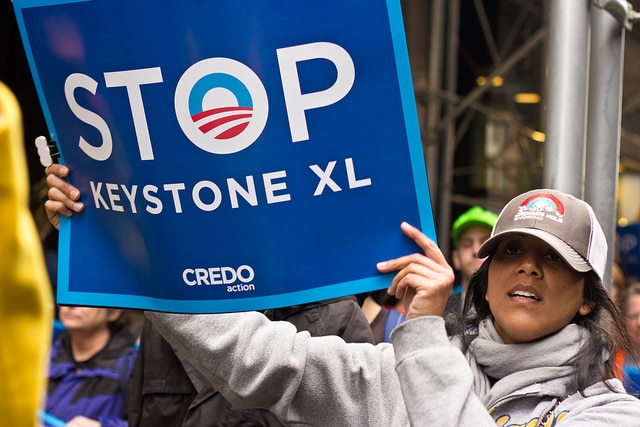More than 100 scientists and economists “concerned about climate change and its impacts” signed an open letter Monday calling on U.S. President Barack Obama and Secretary of State John Kerry to reject the proposed Keystone XL pipeline project, which would transport oilsands crude from Alberta to refineries on the Gulf Coast, mainly for export.
The signers “urge [President Obama and Secretary Kerry] to reject the Keystone XL tar sands oil pipeline as a project that will contribute to climate change at a time when we should be doing all we can to put clean energy alternatives in place.”
The letter, signed by prominent leaders in science and economics, is the latest addition to an already strong and growing opposition to the Keystone XL project in the U.S., including 2 million public comments sent to President Obama and a previous open letter signed last month by over 200 business leaders and entrepreneurs asking for the rejection of the pipeline.
The signers write:
“As you both have made clear, climate change is a very serious problem. We must address climate change by decarbonizing our energy supply. A critical first step is to stop making climate change worse by tapping into disproportionately carbon-intensive energy sources like tar sands bitumen. The Keystone XL pipeline will drive expansion of the energy-intensive strip-mining and drilling of tar sands from under Canada’s Boreal forest, increasing global carbon emissions. Keystone XL is a step in the wrong direction.”
The signers remind President Obama and Secretary Kerry of their previous commitments to combating climate change, and reiterate that “evidence shows that Keystone XL will significantly contribute to climate change.”
The letter emphasizes that fuels from oilsands crude result in higher greenhouse gas (GHG) emissions than fuel from conventional oil. The Keystone XL pipeline would open up overseas markets for higher-polluting oilsands fuels, causing “a sizeable expansion of tar sands production and also an increase in the related greenhouse gas pollution.”
President Obama and Secretary Kerry have yet to make a final decision on Keystone XL. The U.S. State Department’s Final Supplemental Environmental Impact Statement (FSEIS) on the pipeline, released in January, has been criticized by environmental groups as flawed and narrow in scope.
As the open letter observes, “the State Department environmental review chose an inconsistent model for its ‘most likely’ scenarios, using business-as-usual energy scenarios that would lead to a catastrophic six degrees Celsius rise in global warming,” a potential rise that, the signers note, “has no place in a sound climate plan.”
A decision to reject the Keystone XL pipeline, write the signers, would be one “based on sound science,” given the 8.4 billion metric tons of CO2e emissions the pipeline could produce over its expected 50-year lifespan.
“These are emissions that can and should be avoided with a transition to clean energy,” states the letter.
The signers in the letter include Nobel Prize winners Dr. Philip W. Anderson and Dr. Kenneth J. Arrow, environmental activist and broadcaster Dr. David Suzuki, several authors for the United Nations Intergovernmental Panel on Climate Change assessment reports, Fellows of the American Academy for the Advancement of Science (AAAS) including Dr. James McCarthy and Dr. Richard Norgaard, and Fellows of the Royal Society of Canada (FRSC) including Dr. Mark Jaccard, Dr. Lawrence Dill, among numerous other lauded scientists and economists.
The public can add their voice against the Keystone XL pipeline to an online petition hosted by the National Resource Defence Council (NRDC).
Image Credit: maisa_nyc / Flickr
Subscribe to our newsletter
Stay up to date with DeSmog news and alerts






